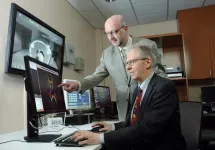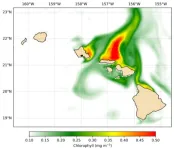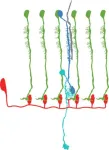(Press-News.org) Summary:
Texas Tech’s Natasja van Gestel has been named Station Science Leader by the National Science Foundation (NSF), enabling her to lead and coordinate research at Antarctica’s Palmer Station while advancing her work on climate change’s impact on glaciers. As a leader, she will oversee multiple scientific initiatives, manage resources and ensure compliance with the Antarctic Treaty’s regulations.
Why This Matters:
Climate Study: Her research contributes vital data on climate change effects in Antarctica, crucial for global climate assessments.
International Collaboration: Leading international research fosters cooperation, essential for tackling global scientific challenges.
Public Awareness: Her role showcases the impact of academic leadership in addressing environmental issues and informing the public.
Natasja van Gestel, an associate professor in the Department of Biological Sciences within the College of Arts & Sciences at Texas Tech University, has been designated a Station Science Leader by the National Science Foundation (NSF) in connection with her ongoing research in Antarctica.
The prestigious designation means van Gestel will not only continue her own work at Antarctica’s Palmer Station, but she will also coordinate logistics and research activities of other scientific efforts taking place in the area while balancing the limited resources available.
Palmer Station is located on the southwestern coast of Anvers Island off the Antarctica Peninsula. In 1990 the NSF designated it a long-term ecological research site with a wide variety of work conducted on ocean and climate systems, aeronomy and astrophysics, glaciology, organisms and ecosystems.
Van Gestel arrived in Antarctica on Oct. 27 and is scheduled to be there throughout the austral summer before eventually returning next April. She has been a leader in examining the impact of climate change on Antarctica, having conducted research there since late 2018 with her work demonstrating how warming temperatures have significantly reduced the size of Antarctic glaciers.
“Professor van Gestel’s research and leadership are exemplary,” said Joseph Heppert, vice president for research and innovation at Texas Tech. “I believe she is a great choice to captain the research activities at Palmer Station. We are proud that she continues to bear our banners far and wide as both a faculty member and Texas Tech alumna.”
According to the NSF, activities at the station and in the field must comply with the Antarctic Treaty, calling for use of the continent and its surrounding waters for peaceful purposes, including cooperative scientific exploration.
“We are so pleased that Dr. van Gestel has been selected to lead this NSF expedition to Antarctica and that she will continue her vital climate research in this often unexplored part of the world,” said Tosha Dupras, dean of the College of Arts & Sciences. “The strides she is making in her field, as well as the fact that she will be in a leadership role during her most recent deployment, are a true testament to the caliber of faculty we have in our college. I’m so proud of this fantastic recognition that has been bestowed upon Dr. van Gestel and am so excited to follow along with her blog throughout her journey.”
Cooperation among the world scientific community has long been a hallmark of Antarctic research efforts. Among her duties as Science Leader, van Gestel is the NSF Office of Polar Programs agent for scientific leadership and mediation; responsible for coordinating and implementing U.S. Antarctic Program research at Palmer Station and in the operational area; and responsible for professional and personal conduct of deployed science personnel in accordance with the Polar Code of Conduct.
She will also provide monthly updates to the NSF on projects and progress. Van Gestel posts regular updates regarding her research in Antarctica on her blog.
END
Texas Tech researcher named Station Science Leader for Antarctica project
2024-10-31
ELSE PRESS RELEASES FROM THIS DATE:
Restricting sugar consumption in utero and in early childhood significantly reduces risk of midlife chronic disease
2024-10-31
A low-sugar diet in utero and in the first two years of life can meaningfully reduce the risk of chronic diseases in adulthood, a new study has found, providing compelling new evidence of the lifelong health effects of early-life sugar consumption.
Published in Science, the study finds that children who experienced sugar restrictions during their first 1,000 days after conception had up to 35% lower risk of developing Type 2 diabetes and as much as 20% less risk of hypertension as adults. Low sugar intake by the mother prior to birth was enough to lower risks, but ...
Apixaban vs aspirin in patients with cancer and cryptogenic stroke
2024-10-31
New Orleans - Ochsner Health physicians Dr. Richard Zweifler and Dr. Joseph Tarsia are co-authors on a post hoc analysis carried out in the ARCADIA randomized clinical trial, comparing the effectiveness of apixaban versus aspirin in preventing adverse clinical outcomes in patients with a history of cancer and cryptogenic stroke. The research found no significant difference in the risk of major ischemic and hemorrhagic events between those taking apixaban and aspirin. The ...
Can magnetic pulses aimed at the brain treat insomnia?
2024-10-31
Traditional solutions for sleep disorders, including medications and cognitive behavioral therapies, often provide insufficient relief for military personnel, a problem researchers from the University of Arizona College of Medicine – Tucson will be hoping to solve with a $3 million grant from the Department of Defense Congressionally Directed Medical Research Program.
Sleep problems are among the top health concerns of military personnel, with an estimated 85% meeting criteria for a clinically relevant sleep ...
F.M. Kirby Research Center honors 25 years of pioneering brain imaging research
2024-10-31
BALTIMORE, October 31, 2024— Kennedy Krieger Institute is proud to celebrate the 25th anniversary of the F.M. Kirby Research Center for Functional Brain Imaging at Kennedy Krieger Institute, a leader in advancements and research in understanding the human brain.
Established in 1999 in partnership with Johns Hopkins University School of Medicine, the center has transformed neuroscience and medical imaging by developing cutting-edge magnetic resonance imaging (MRI) techniques that allow researchers to examine and measure brain function and structure ...
$1.75M CDC grant funds study to boost vaccine acceptance in Arizona’s rural, border communities
2024-10-31
Researchers at the University of Arizona’s Mel and Enid Zuckerman College of Public Health received a $1.75 million Centers for Disease Control and Prevention grant to conduct a community-based, participatory research study designed to improve vaccine uptake in Arizona’s rural and border communities.
Vaccination is a highly effective public health intervention that saves millions of lives per year, yet vaccination rates have declined in recent years for a variety of reasons, ranging from safety concerns to religious and philosophical objections.
“Vaccination is a cornerstone of public health,” said co-principal investigator Tomas ...
Immune system review provides insight into more effective biotechnology
2024-10-31
Macrophage cells are the immune system’s frontline soldiers, early on the scene to protect the body from foreign invaders. These cells answer the immune system's critical question for the rest of its troops: friend or foe?
As critical responders, macrophages can perceive helpful biotechnology as threats. If not created with the right materials or mechanical forces, these devices can trigger an immune response that can cause inflammation, scar tissue or device failure.
But what is the right material or the right mechanical force? In a meta-analysis co-led ...
Remote control eddies: Upwelled nutrients boost productivity around Hawaiian Islands
2024-10-31
Beyond colorful coral reefs and diverse nearshore ecosystems, Pacific Ocean waters surrounding the Hawaiian Islands have comparatively little marine life and low biological productivity. New research published by University of Hawai‘i (UH) at Mānoa oceanographers showed that eddies on the leeward side of the Hawaiian Islands can supply nutrients, not only locally, but also to the opposite side of the island chain and stimulate blooms of phytoplankton, microscopic plant life that lives in the surface ocean.
The study, published in JGR Oceans, was selected by the American Geophysical Union’s editorial board as a featured article.
“While ...
Rice, Texas Medical Center institutions jointly award seed grants
2024-10-31
Rice University together with Baylor College of Medicine and the Houston Methodist Academic Institute has awarded seed grants in support of research on health equity and digital health.
Spearheaded by Rice’s Educational and Research Initiatives for Collaborative Health (ENRICH) office in collaboration with the two partnering institutions in the Texas Medical Center (TMC), the seed grant opportunity followed the Health Equity Workshop hosted earlier this year by Rice’s Digital Health Initiative.
“To achieve equitable health outcomes, a comprehensive approach is essential — one ...
Sleeping for 2: Insomnia therapy reduces postpartum depression, study shows
2024-10-31
While many people believe that poor sleep during pregnancy is inevitable, new research has determined that cognitive behavioral therapy for insomnia (CBTi) while pregnant can not only improve sleep patterns but also address postpartum depression.
Researchers from UBC’s Okanagan and Vancouver campuses, as well as the University of Calgary, discovered that delivering CBTi during pregnancy significantly reduces postpartum depressive symptoms after a baby arrives.
“Early intervention is crucial for infant and parental mental health,” says Dr. Elizabeth Keys, an Assistant Professor in UBCO’s School of Nursing and a study co-author. “Our research explores how addressing ...
How fruit flies achieve accurate visual behavior despite changing light conditions
2024-10-31
When light conditions rapidly change, our eyes have to respond to this change in fractions of a second to maintain stable visual processing. This is necessary when, for example, we drive through a forest and thus move through alternating stretches of shadows and clear sunlight. "In situations like these, it is not enough for the photoreceptors to adapt, but an additional corrective mechanism is required," said Professor Marion Silies of Johannes Gutenberg University Mainz (JGU). "Earlier work undertaken by her research group had already demonstrated that such a corrective 'gain control' mechanism exists ...





